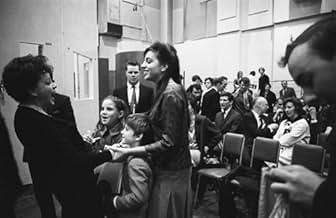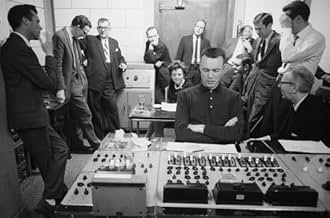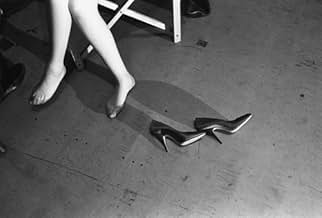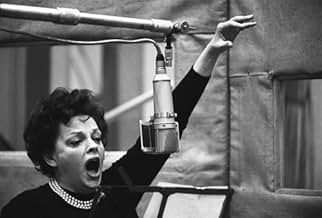अपनी भाषा में प्लॉट जोड़ेंJenny Bowman is a successful singer who visits David Donne to see her son Matt again, spending a few glorious days with him while his father is away in Rome in an attempt to attain the famil... सभी पढ़ेंJenny Bowman is a successful singer who visits David Donne to see her son Matt again, spending a few glorious days with him while his father is away in Rome in an attempt to attain the family that she never had.Jenny Bowman is a successful singer who visits David Donne to see her son Matt again, spending a few glorious days with him while his father is away in Rome in an attempt to attain the family that she never had.
- निर्देशक
- लेखक
- स्टार
- Backstage Parent
- (बिना क्रेडिट के)
- …
- HMS Pinafore Audience
- (बिना क्रेडिट के)
- …
- Theatre Audience
- (बिना क्रेडिट के)
फ़ीचर्ड समीक्षाएं
Credit goes to a sincere, straightforward screenplay with some tart dialogue for Judy that sounds as if it came from her own true life experiences. Indeed, there are backstage stories that Judy and Dirk worked on the screenplay to tighten the emotional force of the drama and punch up the lines a bit--and if so, they have succeeded brilliantly.
Not only entertaining as a dramatic showcase for Miss Garland, it is also highly recommended for the musical interludes during which she performs at the London Palladium in great arrangements of material like "Hello, Bluebird!", "By Myself" and "I Could Go On Singing", among other melodies, all in full control of her "vibrato in search of a voice" equipment.
As a swansong for the actress, it is incredibly moving and a tribute to both Garland and Bogarde. Bogarde is especially intense in his emotional scenes--reminding me somewhat of the brooding character he played so well in LIBEL (a courtroom drama with Olivia de Havilland). He had become a mature actor by that time and here he is even more impressive.
Garland's character, Jenny Bowman, is a thinly disguised self-portrait, down to the fluttery neurotic mannerisms (with hints of pill-popping) and the ability to turn around an audience kept waiting an hour past time for her show at the London Palladium- where Garland had sensationally headlined in 1960. After "A Star is Born" Garland, cheated of her rightful Oscar, had withdrawn to concerts and cabaret for almost a decade except for "A Child is Waiting" and her overheated cameo in "Judgement at Nuremberg". Here, for the last time, she essays full-blooded emotional acting against a worthy British opponent (for James Mason, think Dirk Bogarde) and carries it off pretty well, never becoming tiresome and often laughing at her own overwrought persona. She still looks pretty, too, not quite overwhelmed by the blowsiness of her last few years.
Bogarde, rapidly maturing after his daring role in "Victim", is a superb, challenging foil. Watch how he turns on a sixpence from the surgeon to the ex-lover after reassuring Garland that her throat is okay. His buttoned-up Britishness is never dull; like Ronald Colman, he radiates reliability and sensitivity in a coherent combination. He claimed to have rewritten all his dialogue with Garland during shooting; certainly their exchanges have a cut and thrust which prevents her from chewing the scenery. She has to react as well as posture.
The fans are given generous dollops of Garland's act in between plot scenes, but these reasonably complement and underscore the themes of defiance and sacrifice. Yes, it's soapy and lush, with daft interludes like the helicopter flight over London. But a touch of Limey stiff upper lip takes the saccharine taste away, and the Ronald Neame of "Tunes of Glory" and "The Poseidon Adventure" knows how to keep a story rolling along. File with contemporary efforts such as "The VIPs" and "The Yellow Rolls-Royce" as an enjoyable wallow, to be taken with boxes of paper handkerchiefs and chocolates.
Some twenty years before young medical student Dirk Bogarde, studying in America fell in love with singer Judy Garland just starting her career. That career is something she wanted more than him. But one thing couldn't be changed and that was the boy child Bogarde left with her.
Bogarde marries a girl from Great Britain and later on Judy who can't manage a baby and a career gives him up to Bogarde who adopts his own son with his wife and raises him. Now his wife is dead and Judy's back to lay a claim on her son played by Gregory Phillips.
Of course Bogarde has never told his son about his origin and therein lies the story. It's the kind of tale we've seen in hundreds of films and radio and television soap operas.
But of course what makes I Could Go On Singing special is the singing of Judy Garland. Giving this film which title could serve as her epitaph is Harold Arlen and E.Y. Harburg who wrote the title song and who wrote her famous Over The Rainbow.
Judy also sings By Myself which was sung and danced to by Fred Astaire in The Bandwagon. But a song I'm really glad she did was the Kurt Weill-Maxwell Anderson song It Never Was You. That song comes from the score of Knickerbocker Holiday and it didn't make the screen version. I'm glad that Judy Garland used it in this film, giving it the classiest interpretation possible.
A passable enough drama, but great singing and the best epitaph possible for a career which was one of the brightest.
क्या आपको पता है
- ट्रिवियाOfficially regarded as her final film before her death in 1969, Judy Garland filmed it immediately after making A Child Is Waiting (1963) though I Could Go on Singing (1963) was released first. At the time of filming, Garland was going through an ugly child custody battle of her own with her soon-to-be-divorced husband, Sidney Luft. The opportunity to make a film in England with Sir Dirk Bogarde, an actor and friend she had long admired, provided the perfect escape from her problems at home but unfortunately Garland carried her troubles with her across the Atlantic.
- भाव
Jenny Bowman: You think you can make me sing? Do you think you can - do you think George can make me sing? or Ida? You can get me there, sure, but can you make me sing? I sing for myself. I sing when I want to, whenever I want to, just for me. I sing for my own pleasure. Whenever I want - do you under stand that?
टॉप पसंद
- How long is I Could Go on Singing?Alexa द्वारा संचालित
विवरण
- रिलीज़ की तारीख़
- कंट्री ऑफ़ ओरिजिन
- भाषा
- इस रूप में भी जाना जाता है
- The Lonely Stage
- फ़िल्माने की जगहें
- उत्पादन कंपनी
- IMDbPro पर और कंपनी क्रेडिट देखें
- चलने की अवधि1 घंटा 40 मिनट
- रंग
- पक्ष अनुपात
- 2.35 : 1
इस पेज में योगदान दें






























